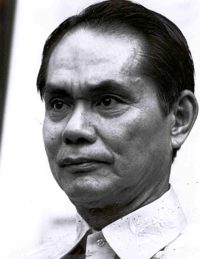I went to the session hall again to submit my amendments to Article XIV on the national economy and the patrimony of the nation. This time, my amendment is no longer one by substitution. Rather, I went through the different paragraphs and made my own individual deletions and additions to the draft of the Steering Council. Likewise, I made my amendment to the article on the National Assembly insofar as the provisions on budget and appropriations are concerned. In both cases, the work was really very, very hastily written. I included some coauthors. In the amendments on the budget, I added the name of Estoy Mendoza. I am sure he would be happy. On the provisions on the national economy, I put in the names of my idealistic friends Gary Teves, Erning Amatong and Dolf Azcuña.
The Steering Council was meeting on the 13th floor. Tony de Guzman was presiding. There were two bottles of whiskey going around.
The meeting was somewhat raucous. The voice of the chairman boomed over the microphone as the privileged delegates discussed the new draft Constitution item by item. According to the Herald lady reporter who has been attending the Convention sessions, it was terrible the way the delegates were earlier treating so lightly the provisions of the fundamental law-in-the-making.
I felt sick watching the discussions. It was as if my colleagues now in power were drafting some rules and regulations for a village fiesta, not writing a Constitution for a nation. These now are our powerful people, these members of the Steering Committee, equivalent to the Seven Wise Men in the 1935 Convention. But I saw the faces of zealots rather than of wise or reasonable men.
“There are many respected personalities in the Convention, how come only a few of them are in the Steering Council?” the reporter asked.
I gave the lady a blank look.
In the evening, I went to the Carmel Church in Broadway. The papers have announced today the death of the mother of Pon and Mel Mathay. Pon saw me as I was coming in. I saw Mel coming out with, of all people, Estelito and Rosie Mendoza.
“We don’t see each other often anymore,” Rosie said.
“Let us get together,” Titong greeted me. “Preferably at your home where the walls have no ears.”
It was really a curious situation—ours—because Titong has really been one of my very best friends in the last 24 years. But now he is solicitor-general—and it is his duty to prosecute those under military custody. I’m thankful to God that I have been free. But if I should be arrested, wouldn’t it be ironic if it is my best friend who will have to prosecute me?
